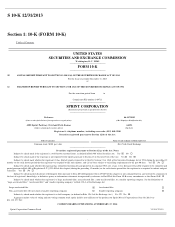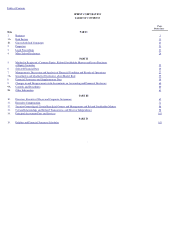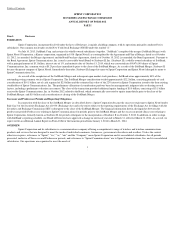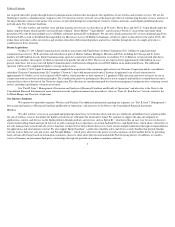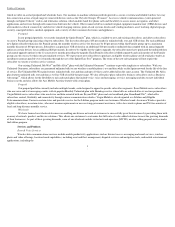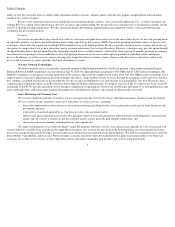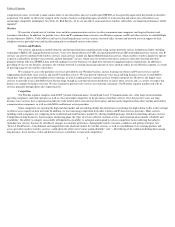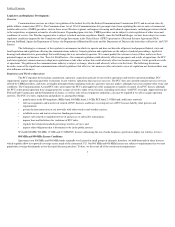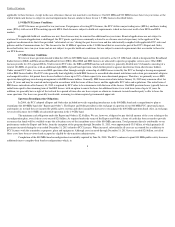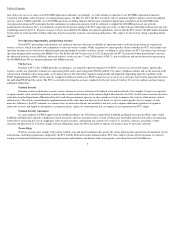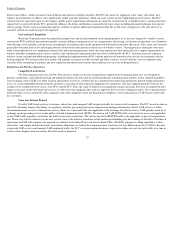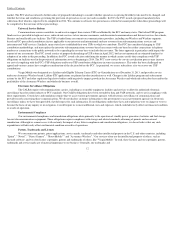Sprint - Nextel 2013 Annual Report Download - page 9
Download and view the complete annual report
Please find page 9 of the 2013 Sprint - Nextel annual report below. You can navigate through the pages in the report by either clicking on the pages listed below, or by using the keyword search tool below to find specific information within the annual report.
Table of Contents
Legislative and Regulatory Developments
Overview
Communications services are subject to regulation at the federal level by the Federal Communications Commission (FCC) and in certain states by
public utilities commissions (PUCs). The Communications Act of 1934 (Communications Act) preempts states from regulating the rates or entry of commercial
mobile radio service (CMRS) providers, such as those in our Wireless segment, and imposes licensing and technical requirements, including provisions related
to the acquisition, assignment or transfer of radio licenses. Depending upon state law, CMRS providers can be subject to state regulation of other terms and
conditions of service. Our Wireline segment also is subject to federal and state regulation. Finally, since the SoftBank Merger, we have been subject to certain
regulatory conditions imposed by the Committee on Foreign Investment in the United States (CFIUS) pursuant to a National Security Agreement (NSA)
between SoftBank, Sprint, the Department of Justice, the Department of Homeland Security and the Department of Defense (the latter three collectively, the USG
Parties).
The following is a summary of the regulatory environment in which we operate and does not describe all present and proposed federal, state and
local legislation and regulations affecting the communications industry. Some legislation and regulations are the subject of judicial proceedings, legislative
hearings and administrative proceedings that could change the way our industry operates. We cannot predict the outcome of any of these matters or their
potential impact on our business. See "Item 1A. Risk Factors—Government regulation could adversely affect our prospects and results of operations; the FCC
and state regulatory commissions may adopt new regulations or take other actions that could adversely affect our business prospects, future growth or results
of operations." Regulation in the communications industry is subject to change, which could adversely affect us in the future. The following discussion
describes some of the significant communications
-
related regulations that affect us, but numerous other substantive areas of regulation not discussed here may
also influence our business.
Regulation and Wireless Operations
The FCC regulates the licensing, construction, operation, acquisition and sale of our wireless operations and wireless spectrum holdings. FCC
requirements impose operating and other restrictions on our wireless operations that increase our costs. The FCC does not currently regulate rates for services
offered by CMRS providers, and states are legally preempted from regulating such rates and entry into any market, although states may regulate other terms and
conditions. The Communications Act and FCC rules also require the FCC's prior approval of the assignment or transfer of control of an FCC license, although
the FCC's rules permit spectrum lease arrangements for a range of wireless radio service licenses, including our licenses, with FCC oversight. Approval from the
Federal Trade Commission and the Department of Justice, as well as state or local regulatory authorities, also may be required if we sell or acquire spectrum
interests. The FCC sets rules, regulations and policies to, among other things:
We hold
800
MHz,
900
MHz,
1.9
GHz and 2.5 GHz FCC licenses authorizing the use of radio frequency spectrum to deploy our wireless services.
800 MHz and 900 MHz License Conditions
Spectrum in our 800 MHz and 900 MHz bands originally was licensed in small groups of channels, therefore, we hold thousands of these licenses,
which together allow us to provide coverage across much of the continental U.S. Our 800 MHz and 900 MHz licenses are subject to requirements that we meet
population coverage benchmarks tied to the initial license grant dates. To date, we have met all of the construction requirements
7
•
grant licenses in the 800 megahertz (MHz) band, 900 MHz band, 1.9 GHz PCS band, 2.5 GHz band, and license renewals;
•
rule on assignments and transfers of control of FCC licenses, and leases covering our use of FCC licenses held by other persons and
organizations;
•
govern the interconnection of our networks with other wireless and wireline carriers;
•
establish access and universal service funding provisions;
•
impose rules related to unauthorized use of and access to subscriber information;
•
impose fines and forfeitures for violations of FCC rules;
•
regulate the technical standards governing wireless services; and
•
impose other obligations that it determines to be in the public interest

